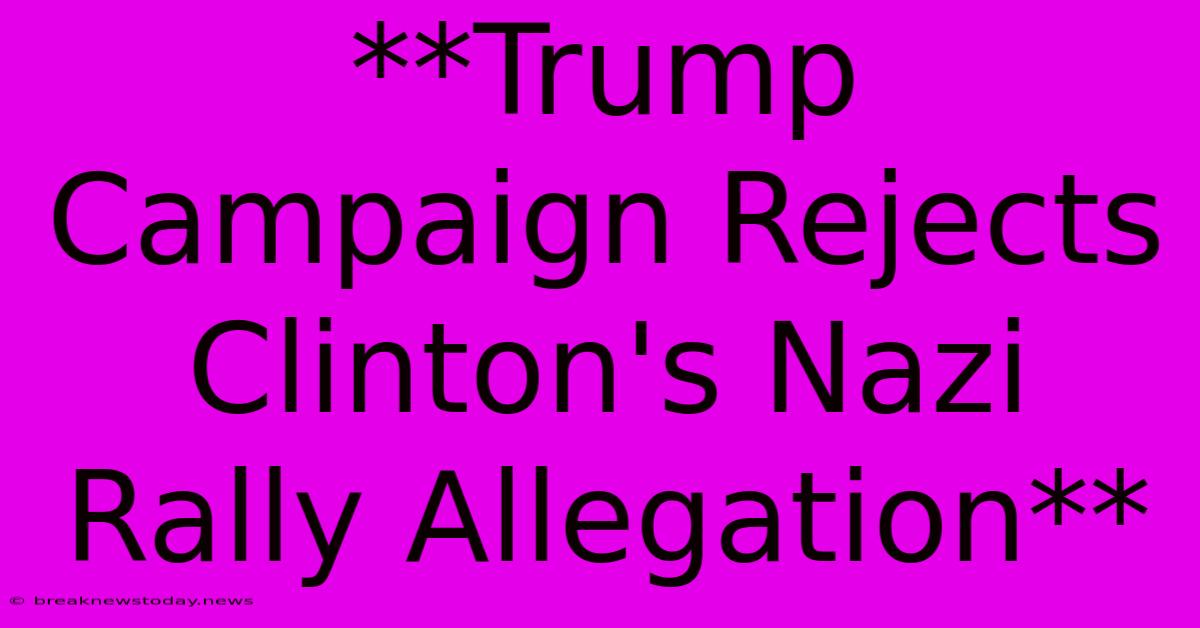**Trump Campaign Rejects Clinton's Nazi Rally Allegation**

Discover more detailed and exciting information on our website. Click the link below to start your adventure: Visit Best Website naughtynakes.com. Don't miss out!
Table of Contents
Trump Campaign Rejects Clinton's Nazi Rally Allegation
The 2016 US presidential election campaign was a fiercely contested race, marked by intense rhetoric and accusations from both sides. One of the most notable controversies involved a statement made by Hillary Clinton, the Democratic nominee, in which she accused Donald Trump's campaign rallies of harboring "hateful rhetoric" and attracting individuals with "Nazi views."
The Accusation and the Response
Clinton's accusation, made in a speech on August 11, 2016, drew immediate attention and sparked a fierce debate. She referenced incidents where protesters at Trump rallies were met with violence, suggesting that Trump supporters held extremist views.
The Trump campaign quickly rejected Clinton's allegation, calling it a "false and outrageous attack." Trump himself took to Twitter, denouncing the statement as "disgraceful" and accusing Clinton of trying to "divide America."
The Context of the Allegation
The context of Clinton's accusation is important to understand. It came amidst a series of high-profile incidents at Trump rallies, where protesters were verbally and physically harassed, leading to concerns about the safety of those attending.
However, it's important to note that these incidents were not necessarily indicative of the views held by all Trump supporters. Some argue that the presence of a small number of individuals with extremist views does not necessarily reflect the overall atmosphere of the rallies.
The Impact of the Accusation
Clinton's accusation, regardless of its accuracy, had a significant impact on the election campaign. It fueled a debate about the nature of Trump's appeal and the extent to which his rallies attracted individuals holding extreme views.
It also contributed to a sense of division and polarization within the American electorate, a trend that has continued to this day.
The Larger Context
The accusations and counter-accusations surrounding the 2016 election campaign highlight the growing political polarization in the United States. It also underscores the challenges of navigating a political landscape where differing viewpoints are often presented as fundamentally incompatible.
Conclusion
While the debate over Clinton's accusation regarding Nazi views at Trump rallies continues, it remains a significant point of contention in understanding the nature of the 2016 election. The issue reflects the complex political climate of the time and serves as a reminder of the ongoing challenges of political discourse in the digital age.

Thank you for visiting our website wich cover about **Trump Campaign Rejects Clinton's Nazi Rally Allegation**. We hope the information provided has been useful to you. Feel free to contact us if you have any questions or need further assistance. See you next time and dont miss to bookmark.
Featured Posts
-
Fc Vaduz Auswaertssieg In Wil Das Ziel
Oct 28, 2024
-
Republican Campaign Addresses Tony Hinchcliffe
Oct 28, 2024
-
Adiev Kritikuet Rabotu Stankovicha V Spartake D D N D D D D D N D N D N D Dd D D D D D D D N D D D D D D D D D D Dnd N N N D D D D D D D
Oct 28, 2024
-
Bird Impacts Offshore Renewables In Aotearoa
Oct 28, 2024
-
Hibs Vs Hearts Statistical Showdown
Oct 28, 2024
